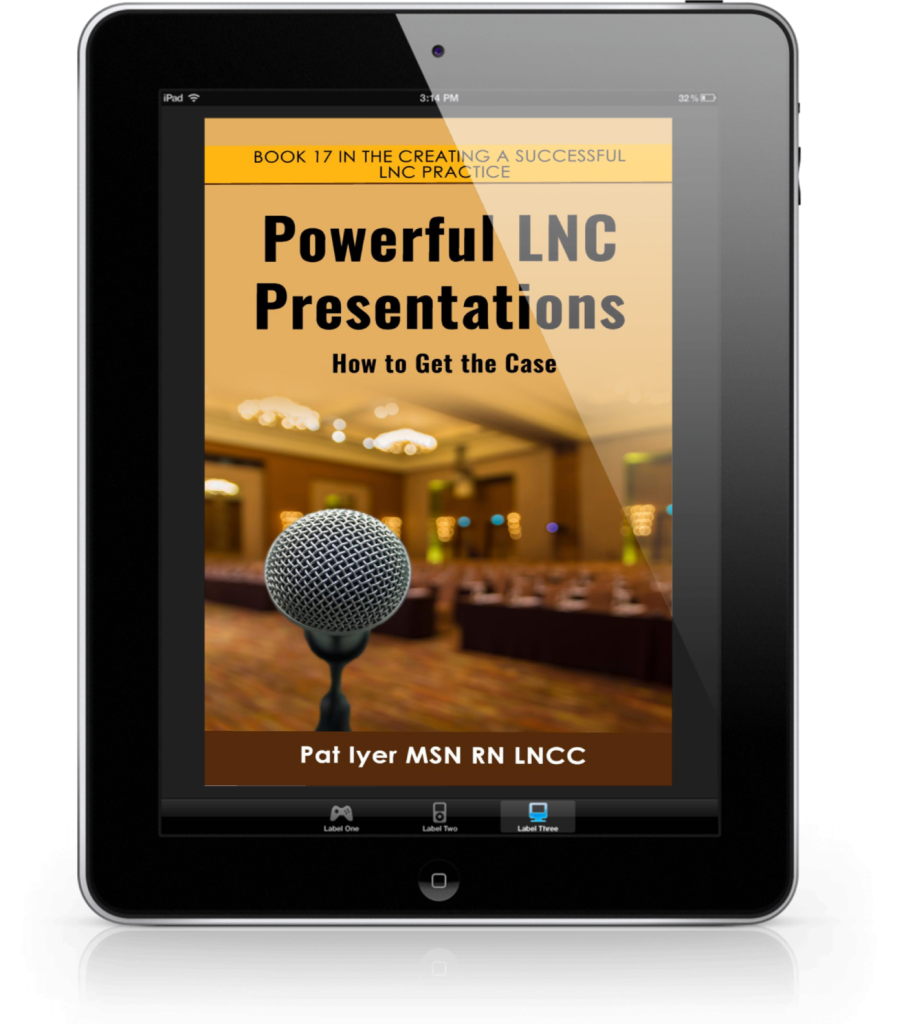How to Create a Successful LNC Sales Presentation
Learn how to create a successful LNC sales presentation today. Your primary job before you ever walk into the law firm is to prepare yourself for a successful sales presentation – as carefully as you would for a job interview. This event is a job interview.
LNC Sales Presentation
Preparation for Your Meeting with the Attorney
What do you need to know about the attorney?
- What type of law does he practice?
- What type of cases does his firm handle?
- Where did he go to law school?
- Has his firm had any notable recent victories?
- How old is he?
- Does he have any hobbies?
Where do you get these answers?
Do an internet search, find his firm’s website, and look on Facebook and LinkedIn. Look for him on Martindale.com, a site that gives details about attorneys.
How confident are you?
Assess your confidence level. First, recognize that a word-of-mouth referral is golden. If this attorney asked you to meet with him, you are already 90% closer to landing him as a client. All you must do is show up, handle the meeting well, and close the sale.
Ask Questions
On the day of the appointment, dress in your best clothes. Get to the law firm early. Be pleasant to everyone you encounter. A surprising number of otherwise intelligent people make critical errors at this stage, the foremost of which is to be arrogant to people they perceive as underlings.
After the receptionist escorts you to the attorney’s office, your first impression is critical. Greet the attorney, shake his hand, and wait to be directed where to sit. As you scan his office, note if there are files on the floor, piles of paper on the desk, a computer near him, or exhibit boards leaning against the wall. These may all give you clues for questions to ask.
Notice the evidence of the attorney’s hobbies, interests, family, and affiliations. Comments on these items and use them to establish rapport.
During the meeting, if your research has uncovered anything you can use to establish rapport with the attorney, bring it up. Demonstrate that you understand what kind of cases he handles. Ask more questions and listen to what the attorney tells you. It is a natural tendency to babble when you are nervous. However, getting the attorney to share with you is your job. Recognizing that sales are emotional, you are establishing rapport and putting the attorney at ease. You are building the know, like, and trust factors.
Prepare a set of questions to ask the client, but don’t read them from a pad. Work them into the conversation.
Questions you might ask an attorney:
- What aspect of working with medical records do you find most frustrating?
- What do you look for in an expert witness?
- What part of handling medical issues do you find to be difficult?
- Do you ever have difficulty reading a doctor’s handwriting?
- Do you ever feel you don’t have time to complete medical research?
- Do you ever wonder if your paralegal might miss a key medical fact?
- Do you ever find it challenging to separate pre-existing conditions and injuries from those that arose from the accident?
Create a list of at least 10 great questions directed to the kind of practice the attorney has. These and other questions are a starting point for probing the attorney’s “pain” – the problematic aspects of his law practice. (See Chapter 10 for a more detailed description of how to discern an attorney’s pain and get him or her to talk about it.)
Remember your training in therapeutic conversations with patients. Listen carefully to the attorney’s words, and don’t babble to fill in silences. The attorney may be silent while thinking of cases for you rod additional questions to ask you. Be attentive, stay focused and engaged, and display your personality and sense of humor.
Explain how your LNC services will help the attorney relieve his pain. Emphasize how your knowledge of the healthcare environment will assist the attorney.
Tailor this part of your interview to match what you offer. Discuss the benefits of working with you and your services.
Examples of What LNCs Do for Attorneys
LNCs Evaluate Medical Records.
You can decipher medical records. An LNC is often responsible for the initial review of medical records as a case begins. You can keep abreast of the plaintiff’s medical status and periodically obtain additional medical records. Plus, You may see references to other providers that the plaintiff forgot about or didn’t mention in your review of documents. You will make a recommendation of whether those records are essential to get.
Typically, firms on both sides obtain records from the plaintiff’s primary care physician, going back 10 to 15 years before the alleged malpractice, to get a sense of the client’s baseline health, especially pre-existing conditions.
It’s also essential to know whether there is anything in the records that might impact the plaintiff’s credibility. The documents may refer to a history of drug or alcohol abuse or legal troubles. Prove your worth to the attorney by pointing out these issues.
Here’s an example: Failure to keep appointments may raise the defense that the plaintiff is partially responsible for his injuries, such as failing to undergo a recommended course of treatment.
LNCs Obtain Medical Literature
Both defense and plaintiff LNCs may conduct an in-depth medical literature search as the issues in the case become more focused on liability or damages issues. This service would include obtaining peer-reviewed journal articles, excerpts from authoritative medical textbooks, and clinical guidelines written by professional organizations. You can often read dense scientific papers and determine what is relevant to the case.
LNCs talk with Experts
You may search for and interact with experts retained to review the liability, causation, and damages issues. Medical experts are often more comfortable discussing medical details with an LNC than attorneys. Our knowledge enables us to ask questions that might not occur to the attorney.
Following the completion of depositions in which a lot of additional information is obtained, both plaintiff and defense LNCs may coordinate further review and discussions with experts based on information revealed during the depositions. Typically, this involves forwarding copies of the relevant transcripts to the experts and following up with a phone conference or sometimes a meeting with the expert. You may also summarize the deposition.
LNCs Evaluate the Expert’s Positions – a Great Way to Prove Worth to the Attorney
Both plaintiff and defense LNCs assist their clients in evaluating the deposition testimony and reports of experts. The LNC helps the attorney see the holes in the reports and prepare the experts for rebuttal reports.
Medical experts in some states are not identified or deposed before trial. In these states, LNCs for both attorneys review and analyze opposing sides’ expert witness disclosure. This document is exchanged just before the trial that sets forth the general qualifications of the experts and the basis for their opinions but does not reveal their identity.
LNCs Write or Evaluate the Demand Letter
Plaintiff LNCs may be called upon to draft a demand letter for the attorney, which draws upon the legal nurse consultant’s ability to analyze and synthesize information, organize it, and explain it in simple terms. It would help if you had a high-level ability to summarize the liability, causation, and damages issues before the attorney reviews them.
The defense LNC would then review the plaintiff’s demand letter and provide the defense attorney with an analysis of the strengths and weaknesses of the case along with their likely exposure (meaning the risks) if they proceed to trial.
When you sell to attorneys, here are the key points to emphasize:
- You have the skills to read and analyze medical records, which saves the attorney time and offers a skill they may not have.
- You can locate relevant medical literature and understand how it impacts the case, a skill the attorney usually does not have.
- You can speak the expert’s language and act as an interface between the expert and the attorney. This capability helps the expert stay focused on the relevant issues.
- You can evaluate and summarize the expert’s position.
- You can synthesize, organize, and analyze liability and damages issues.
LNC Sales Presentation: Bring Samples
Bring a sample work product with you to a sales meeting. Attorneys like to see what you can produce. They are usually visual people who need to see the tangible result of your knowledge and skills. You need not show a complete report or chronology – just enough to show the format you follow. Carefully proofread whatever you show to the attorney. This skill is crucial. Sloppy work equals sloppy performance. There is too much at stake for the attorney to be willing to take a risk on someone who is not detail-oriented.
Your sample legal nurse consulting work product should not contain real names. Redact or change the names of the people in the work product. Hand your sample work product to the attorney and sit back. Many attorneys like to flip through or scan the work product but will have difficulty absorbing what they are reading if you chatter. Be prepared to answer questions, including, “What did it cost to prepare this report?” “What is your hourly rate?”
What to Do if You Don’t Have Sample Reports
See my self-guided course, Report Writing Mastery at http://LNC.tips/RWM. You’ll receive records of a case and prepare sample reports. I’ll share my feedback on the reports and give you the versions I prepared. Gain confidence in a safe environment.
Also, hand the attorney a business card, brochure, and cover letter – the information the attorney needs to be able to contact you with a case.
Close the sale by asking the attorney, “Do you have any questions of me? Do you think we will have an opportunity to work together?”
In the best of worlds, the attorney will reach over to a spot on his desk, hand you a set of medical records, and discuss what he needs for the case. Then you know you’ve closed the sale!
Be sure to get my latest book in the Creating a Successful LNC Practice Series, Powerful LNC Presentations: How to Get the Case.

Pat Iyer is president of The Pat Iyer Group, which develops resources to assist LNCs in obtaining more clients, making more money, and achieving their business goals and dreams.
Pat’s related websites include the continuing education provided on LNCEU.com, the podcasts broadcast at podcast.legalnursebusiness.com, and writing tips supplied at patiyer.com.
Get all of Pat’s content in one place by downloading the mobile app, Expert Edu at www.legalnursebusiness.com/expertedu. Watch videos, listen to podcasts, read blogs, watch online courses and training, and more.




